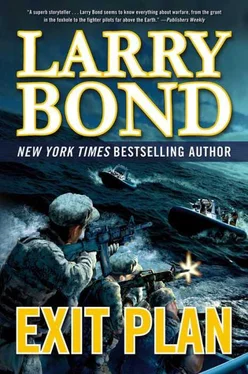“Could the ASDS travel the distance if Michigan stayed outside the twelve-mile limit?” he asked.
Joanna paused, considering a moment before answering. “Yes, sir. It has a range of a hundred and twenty-five nautical miles at five knots.”
“So a total run of what? — twenty-five or thirty miles, is well within its abilities, and at least Michigan is in the clear. Will it affect the timing of the operation?”
Patterson studied her notes. “Not significantly, sir. Michigan will be on station well before the ASDS is launched. It will double their time inside the ASDS, but it’s ‘dry,’ so fatigue isn’t the problem it was with earlier vehicles.”
“Then is there any other reason to put a nuclear submarine inside Iranian waters?”
Patterson looked at Kirkpatrick, Hughes, and Ramsdale. They’d built the plan together but had never considered keeping Michigan back. They all looked unhappy, but nobody spoke.
“Then change the plan so that Michigan remains outside Iranian territorial waters. Also, add in a slight buffer to guard against any navigation errors,” Myles ordered.
“We’re still violating their territory,” Kirkpatrick reminded him.
“I understand that, Ray, but perceptions are important. And in this instance, there is a very big difference between the ASDS and a very large cruise missile-armed nuclear submarine.”
Patterson nodded, making notes. “We’ll make the change immediately.”
“It would be better if we didn’t have to send anyone into their territory,” Lloyd insisted. “If we’re discovered, the Iranians will turn it into a major incident.”
“Like they need an excuse,” the SECDEF muttered.
“Let’s not hand them one,” Lloyd countered, annoyed. “Imagine the propaganda campaign if they capture U.S. commandos lured ashore by someone pretending to be an American agent.”
The SECDEF shook his head. “They don’t show themselves until it’s clear, and they’ll only be on the beach for ten or fifteen minutes. Mr. President, I agree with Ray and his people. Either we do this, and accept the low risk, or lose Opal and the information he carries. And what about the propaganda coup if VEVAK arrests Opal?”
Lloyd persisted. “I’m assuming there’s nobody else in Iran — anywhere — that we can use to get Opal out of the country.”
Patterson started to answer, but Foster broke in. “That was our first choice, Mr. Secretary, but again, without giving too much detail, Opal’s movements are being watched. We are using this secondary plan,” Foster said, emphasizing the word, “because my people don’t have any safe way to get him and his wife out quickly.” He motioned toward Hughes and Rams-dale. “When we couldn’t do it, we asked the Navy and SOCOM to help.”
The CIA director turned back to Patterson. “Michigan will be on station by 1600 hours local time tomorrow. With your approval to proceed, the operation will start about an hour later. By this time on Thursday, Opal should be safe and the information should be in our hands.”
Myles and Patterson both scanned the room. Lloyd looked unhappy, and Duvall grim, but there we no dissenters. “All right, Dr. Patterson, gentlemen, proceed with the operation.”
South of Shiraz
Bushehr Province, Iran
They headed south on Highway 65, another couple on an excursion to Bandar Kangan. They’d made reservations for three nights at a modest hotel near the ocean. After a drive to the coast and lunch in Bandar Tahari, Shirin and Yousef would explore some of the ancient Persian ruins before arriving in Bandar Kangan by midafternoon. The next day, they’d visit a national park farther down the coast before beginning the return trip home.
Shirin’s mother, Mehry, had completely approved. “You spend too much time indoors, Shirin. Maybe underground, if the stories I’ve heard are true.”
“Mother, please don’t repeat rumors.”
“Go. Take walks by the ocean. Get some fresh air. We’ll have plenty of time to visit later.”
So they’d made their plans and left Mehry’s home, a little later than planned, because their car had developed some sort of mechanical fault that Yousef couldn’t fix. They’d intended to get on the road early, and none of the garages were open, so Mehry traded cars with them. Shirin had protested. “Mother, what will you use?”
“I’ll ring Yashar once his garage is open. I’m sure he can come round today and fix it.” Yousef and Shirin had a Chinese-made Cowin, their first purchase as a married couple. It was a little extravagant, and much nicer than her mother’s twelve-year-old Peykan.
It had taken only moments to shift their luggage, and they drove off, only half an hour behind schedule.
Shirin kept it inside until they were outside of town. They’d driven silently for a while, each with their own thoughts. Finally, Yousef said, “It’s good we can leave her with the Cowin. It’s a much better car…”
And she’d started to cry. Clutching Yousef s arm as he drove, she sobbed into his shoulder, breathing in gasps. All her worries, the fear, and the grief of parting poured out of her. She tried to speak, and Yousef did his best to listen, but he could understand only a word here and there. One question barely squeaked out, “Will she be safe?”
“I don’t know, probably,” Yousef half lied. The Pasdaran weren’t usually kind to family members of traitors. He had no concerns for his own mother; the woman who had lovingly raised him had been gone for over a year. Her body still functioned, but Alzheimer’s had destroyed her mind. She no longer remembered him, and could barely talk. Yousef relived the pain he felt when he told her she was going to be a grandmother and all she did was stare vacantly and drool. Death would be more merciful.
An eternity later, when Shirin had finally stopped crying, she drew a slow breath and said quietly, “Yousef, I’m very afraid. For mother, the baby, for you, and me.”
Her admission shocked him. She’d always been as determined as him, as passionate about their cause as he was, although for her own reasons. Both were scared, of course, but they’d never spoken of it. He thought of her as the strong one.
He had to say something. “It’s a simple plan,” he finally said. “We drive along the beach. We stop for a walk to admire the sunset, and happen to meet some strangers. Who happen to be wearing wet suits. And have a submarine.”
She laughed in spite of her tears. “Oh, well, that’s fine, then. I love walks on the beach.” There was nervousness in her voice, but she was smiling. “I am glad we left our car with mother. This thing smells.”
“It may smell, but the Peykan doesn’t have any tracking devices on it,” Yousef replied. “Remember yesterday, after we arrived and I went out to check the engine? There were marks on the lower body — streaks where the dirt had been rubbed off. I couldn’t see anything underneath, but you never really know how small those devices can be. They could listen to what we say, track our location, and perhaps even disable the engine if they wanted to. I suspected as much.
“That’s when I put the dirt in the Cowin’s fuel filter. Our car will tell Rahim and his jackals that we are staying at your mother’s for the next three days. And if we miss the meeting tomorrow, we will stay at the hotel for the next two nights and have a nice excursion by the shore. We can return to your mother’s house, and then go back to Natanz with nobody the wiser.”
She shook her head. “No. If they aren’t ‘wiser’ now, they will be soon. I can’t describe how nervous I was when I arranged my leave. The security people lectured me for half an hour, and Major Rahim himself kept ‘passing by,’ asking questions about my mother and our plans, especially when we’d be back. The whole time, my stomach was in knots.” She hugged herself. “We can’t go back. I couldn’t say good-bye to mother like that again.”
Читать дальше












